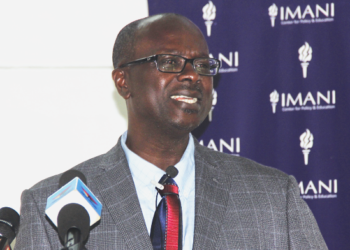Economist, Dr Theo Acheampong, has expressed the need for government to start a national movement to change the taste and preference of Ghanaians, following the regulation seeking to restrict the importation of rice, fruit juice, and other “strategic products”.
According to him, the proposed restriction is a question of tastes and preferences. By this, he indicated that Ghanaians have a penchant for foreign goods even if they are inferior and harm their health.
Dr Acheampong revealed that although it has not always been like this, Ghanaians have lost the “collective national dignity and sense of self”.
With this, he noted that although he understands the rationale behind the move, especially on the “policy implementation to drive the intended outcomes”, he does not support a blanket ban or restriction on the said 22 products.
However, he highlighted that government should rather use other trade tools like increasing the tariffs, duties and other non-trade barriers to support local producers of these products.
“… Let us start a national movement to change our tastes and preferences. A sustained ‘Produce and Eat Ghana’ campaign. It is doable!”
Dr Theo Acheampong
Elaborating on the majority in parliament’s move to impose these restriction, Dr Acheampong stated that paragraph 394 of Ghana’s 2024 budget, indicates that it is estimated the country spends about US$2.0 billion to import poultry, rice, sugar, vegetables, and other food products annually, thus placing undue pressure on the cedi.
As such, he noted that to correct the imbalance, the government is seeking to restrict the importation of these products and has laid before Parliament a Legislative Instrument (L.I.) which seeks to restrict the importation of same.
To this end, he expressed that a restriction of such nature may contravene World Trade Organization protocols and other trade agreements Ghana signed, such as the economic partnership agreement with the EU.
Incentivizing local industry to boost production
Meanwhile, Dr Acheampong noted that the government has a good medium-term growth strategy which seeks to “support the implementation of interventions that increase our capacity to produce, deepen value-chain arrangements, facilitate and modernize storage and increase the shelf-life of products, promote competitive import substitution and exports, create jobs, and ensure food security and resilience”.
This, he explained, is where the collective focus should be – especially on incentivizing the local industry to increase their capacity to produce competitively.
“Similarly, the national demand for tomatoes in 2022 was estimated to be 1,257,348 mt, while local production accounted for less than half at 468,280 mt.
“So clearly, there are capacity issues that need to be addressed, which is what the policy and other interventions should focus on addressing and not impose restrictions.”
Dr Theo Acheampong
Among other things, Dr Acheampong underscored that instead of restricting the imports entirely, government should instead phase the restrictive items over a period.
Additionally, he revealed that also the creation of an all-powerful Committee to vet who gets a license to import these items can lead to “Kalabule” and the repetition of the mistakes of the past.
Owing to this, he emphasized the need to deliberate policies that address the high cost of doing business in Ghana, which doesn’t make local goods competitive.
“It is a matter of getting local capacity at a competitive price. The government and minister of trade and finance should call a roundtable with all top producers and importers of these items and specifically ask them what the government can do to help them produce locally and competitively.”
Dr Theo Acheampong
READ ALSO: National Boundary Commission Appeals For Funding In Boundary Reaffirmation





















